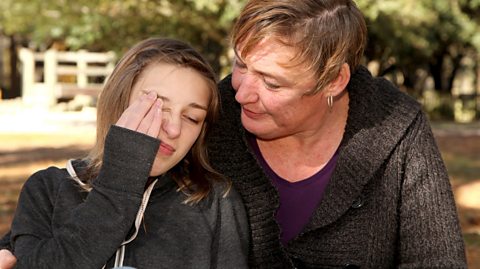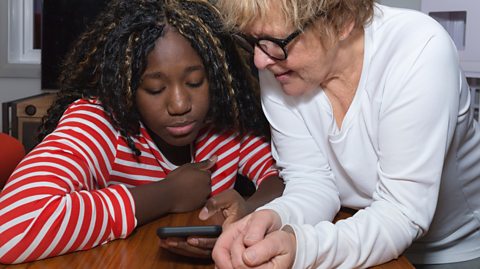By Dr Amita Jassi, Consultant Clinical Psychologist and Dr Bruce Clark, Consultant Child and Adolescent Psychiatrist, from South London and Maudsley NHS Foundation Trust.
The COVID-19 pandemic has led to dramatic changes in how young people and families are living their lives. Over the last two years, we've been bombarded with information about how this health threat has affected the world, and the government has provided guidance on taking extra care around hygiene and socialising with others to reduce the likelihood of catching the virus.
Whilst it's normal and understandable for young people to worry about the pandemic, for some it may be that their worries and associated behaviours to reduce the likelihood of catching or spreading the virus become excessive, time-consuming, distressing and may get in the way of life. Here is some advice to support you to recognise the possible signs that your child may be troubled with COVID-19 worries and/or that they are engaging in excessive behaviours, as well as offering some tips on how you can help them.
1. Notice the worries and behaviours
 Image source, GETTY IMAGES
Image source, GETTY IMAGESThe first and most important step any parent can take is to notice and recognise what is going on. Your child may seem more anxious than usual, or they may be asking you and others repeated questions about the their worries. They may appear preoccupied or distracted.
Behaviours you may notice might include:
- Going beyond the government guidelines in terms of how much and for how long they wash their hands
- Avoiding places or people although restrictions have eased
- Searching the internet for information about the pandemic or hygiene measures
It is important to remember that, for most families, once at home, we can behave almost entirely like we did before the pandemic. It can be worth noting if your child is not managing this, perhaps by continuing with excessive washing or cleaning. It may be helpful to speak to someone else who has contact with your child and knows them well, such as your partner, a relative or a teacher, to see if they are noticing these worries or excessive behaviours.
2. Speak to your child
 Image source, GETTY IMAGES
Image source, GETTY IMAGESWhen talking to your child, it is important to have an open conversation and ensure they feel understood and that they do not feel they are doing anything ‘wrong’. It can be helpful to normalise their worries and explain that they are understandable, especially in the context of the pandemic. You can explain that, for some people, these worries can become bigger and because of this they may do some things excessively, which can make them upset and get in the way of activities they usually enjoy.
Maybe ask your child if they think this is the case for them. If they are struggling to open up, you can leave the conversation and return to it another time, or you can share with them what you have noticed, explaining that you are there to support them. It’s always good to remember to try and have these sorts of conversations when you and your child are relaxed and have the time and space to listen carefully to any thoughts or worries.
3. Decide to tackle it together
 Image source, GETTY IMAGES
Image source, GETTY IMAGESOnce you have both recognised there is a difficulty around worries and excessive behaviours, it is important to decide to tackle this together. Some young people may not see the point of this or may be resistant, so take your time and don’t expect them to sign up to this straight away. You may have to revisit this conversation a few times. It may be helpful to draw up a list of the pros and cons of making a change to help support them.
Alongside this you could implement a reward system to help incentivise overcoming challenges. Children are often most motivated by rewards they have requested, but they don’t always have to cost money. For instance, time together reading a book, or extra time to watch a favourite TV show are a couple of simple no-cost rewards.
4. Come up with an action plan
 Image source, GETTY IMAGES
Image source, GETTY IMAGESOnce you have decided to challenge these issues, it is important to come up with an action plan, so everyone in the family knows what is happening and so your child is clear about what they have signed up to. One way to do this is to list all the excessive behaviours your child is doing, including asking for reassurance from you.Once this list has been developed, you can ask your child what they feel is easier to tackle and what may be harder for them so they can be put in order.
It may be that they give it a go and struggle. If this happens don’t despair - this may be a sign that the challenge was too difficult and perhaps needs to be broken down into more manageable steps. For example, if they wash their hands 20 times a day, ask them how it would feel to start with doing it 19 times a day instead.Explain to your child that you will work together to find the right challenge and will learn from things that have not worked well. Once you feel your child has consistently managed to tackle this specific behaviour, then you can decide to move onto the next thing on their list.
5. Let your child know anxiety lessens over time
 Image source, GETTY IMAGES
Image source, GETTY IMAGESIt is likely your child will feel anxious when challenging these behaviours, as they may be worried about the consequences. For example, they may think that not washing their hands will result in them catching the coronavirus.It is important to explain to your child that they will get anxious, but we know that anxiety does not last for long and always lessens over time, and the more you do something, the easier it gets.
It may be helpful for you to share with them experiences where you have faced your fears and when you have experienced anxiety that eventually went away. You can also remind them of times they have experienced anxiety before, for example starting a new school. It is very usual that once young people have consistently challenged their behaviours, the associated worries will also start to lessen.
6. If you need more support
Around 1-2% of young people have Obsessive Compulsive Disorder (OCD), which is when worries or intrusive thoughts, as well as associated behaviours or rituals, take up more than an hour a day, cause significant distress and get in the way of their usual activities.
For most young people, following the steps above will be enough to support them to change the behaviours. It is likely that these sorts of worries and behaviours will not be long lasting. However, if you have tried the above suggestions for some time and there has not been a change or things are getting worse, you may wish to seek further support (see links below).
Discussing things with your general practitioner could be a good starting point if you are worried. One important thing to note is that OCD is a very treatable condition and most people fully recover.

For more advice on looking after your family’s mental health during this time, there are some useful tips in this series of animations Families Under Pressure, developed by King’s College London, South London and Maudsley NHS Foundation Trust and The Maudsley Charity to help support families during the pandemic.
Dr Amita Jassi has also helped launch a study called SPARKLE - Supporting Parents And Kids Through Lockdown Experiences, which has recruited parents and carers to test a new Parent Positive app that aims to improve children’s behaviour and confidence as well as a positive effect on parents’ wellbeing.
For more detailed advice on obsessive compulsive behaviours there is helpful information at OCD Action.

BBC Headroom
Mental health advice for parents of children, teenagers, and children with SEND.

Parents' Toolkit
Fun activities, real-life stories, wellbeing support and loads of helpful advice - we're here for you and your child.

How to use Bitesize Daily
Get the lowdown on our new service to help you learn at home.
